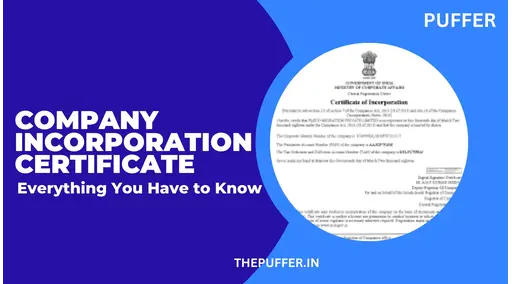Starting a business in India takes more than just an idea and investment. To operate legally, you must register your company and obtain a Company Incorporation Certificate. This official document gives your business a legal identity and allows you to access financial, legal, and operational opportunities.
Whether you’re launching a private limited company, a one-person company, or a limited liability partnership (LLP), this certificate is your legal foundation. In this guide, you’ll discover everything about the certificate, from its legal meaning to how to obtain and use it.
What Is a Company Registration Certificate?
A Company Registration Certificate, also called a Certificate of Incorporation, is issued by the Registrar of Companies (ROC) under the Ministry of Corporate Affairs (MCA). This document certifies that your company has been incorporated under the Companies Act, 2013.
Think of it as the birth certificate of your business. It marks the official formation date of your company and establishes it as a separate legal entity.
What Information Does It Include?
The certificate contains:
- Company name
- Corporate Identification Number (CIN)
- Type of company
- Date of incorporation
- Jurisdiction and registered office
Once you receive this certificate, your company is legally recognized and can begin operations.
Certificate of Incorporation in Company Law
Under Section 7(2) of the Companies Act, 2013, the Certificate of Incorporation serves as conclusive proof that a company legally exists. After successful verification, the ROC issues a digitally signed COI, confirming that your company meets all legal requirements.
Importantly, once this certificate is granted, it cannot be challenged due to any procedural errors in the registration process. The company continues to exist legally unless dissolved through proper legal channels.
Why Is the Company Incorporation Certificate Important?
Registering your business is not just a legal formality. The certificate provides various advantages that help ensure long-term growth and compliance.
1. Legal Recognition
The certificate gives your company an identity that is separate from its founders. This allows the business to:
- Own assets
- Enter contracts
- File lawsuits or be sued
- Operate independently
2. Lawful Operations
According to Indian law, running an unregistered company is illegal. Incorporation ensures compliance and protects the rights of both the company and its stakeholders.
3. Opening a Bank Account
Most Indian banks require the certificate to open a current account in your company’s name. This is a crucial step for managing business finances.
4. Tax and Licensing
You’ll need the certificate to apply for:
- PAN and TAN
- GST registration
- Import-export code
- Professional licenses
Without it, your business cannot collect taxes or function legally.
5. Access to Funding
Investors and banks demand proof of registration before providing funding. The certificate is often the first document checked during due diligence.
6. Building Trust and Credibility
Having a legally registered company boosts confidence among clients, suppliers, and employees. It shows that your business is serious, legitimate, and reliable.
How to Get a Company Registration Certificate in India
In 2025, the entire company registration process is digital and managed through the MCA portal. Typically, you’ll receive the certificate within 7–10 working days if all documents are correct.
Step 1: Get a Digital Signature Certificate (DSC)
All proposed directors must obtain DSCs to sign documents online.
Step 2: Apply for Director Identification Number (DIN)
Each director must have a unique DIN issued by the MCA.
Step 3: Reserve Your Company Name
Use the RUN (Reserve Unique Name) service or SPICe+ form to apply for a unique company name.
Step 4: Complete the SPICe+ Form
This unified form allows you to apply for:
- Incorporation
- PAN and TAN
- GST (optional)
- EPFO and ESIC
- Professional Tax (where applicable)
Step 5: Upload Required Documents
You’ll need to submit:
- Memorandum of Association (MOA)
- Articles of Association (AOA)
- Address proof of the registered office
- Identity and address proof of directors/shareholders
- Declaration of compliance
Step 6: Submit and Pay Fees
After uploading, pay the government fees and submit your application for review.
Step 7: Certificate Issuance
Once approved by the ROC, your digital certificate will be emailed and made available on the MCA portal.
Key Contents of a Company Registration Certificate
Here’s what you’ll find on the certificate:
- Company name
- Type of business (Private Ltd, LLP, OPC, etc.)
- CIN (Corporate Identification Number)
- Incorporation date
- Registered office state and jurisdiction
- PAN and TAN (in most cases)
- MCA digital signature and official seal
This document is legally valid throughout India.
How to Download the Certificate of Incorporation Online
You can easily access the certificate online via the MCA portal. Follow these steps:
Step 1: Go to the MCA Website
Visit https://www.mca.gov.in. Use the official .gov.in domain for security.
Step 2: Navigate to MCA Services
Click on “MCA Services” in the top menu.
Step 3: Choose “View Public Documents”
This allows access to company documents filed with the ROC.
Step 4: Log in
Enter your MCA user credentials. If you don’t have an account, register for free.
Step 5: Search the Company
Use the company name or CIN to locate your business.
Step 6: Locate the Certificate
Look for Form INC-11 or the “Certificate of Incorporation” in the filing history.
Step 7: Download the PDF
Click to download and save the file.
Step 8: Safely Store the Certificate
Keep both digital and printed copies in secure locations for legal and operational use.
Final Thoughts
Your Company Registration Certificate is the first step toward building a compliant, scalable, and credible business in India. It not only legitimizes your venture but also opens doors to funding, taxation benefits, partnerships, and long-term growth.
To avoid errors or delays, consider consulting a professional who understands the registration process thoroughly.
FAQs
1. Why do I need a company registration certificate?
It confirms your company is legally recognized and allows you to operate, open bank accounts, and apply for tax registrations.
2. How long does it take to get the certificate?
Usually 7–10 business days if documents are accurate and complete.
3. Can I download the certificate later if I lose it?
Yes, it can be downloaded anytime from the MCA portal using your company name or CIN.
4. What changes can be made to the certificate post-incorporation?
Name changes, company type conversions, or jurisdictional changes can lead to an updated certificate upon ROC approval.


